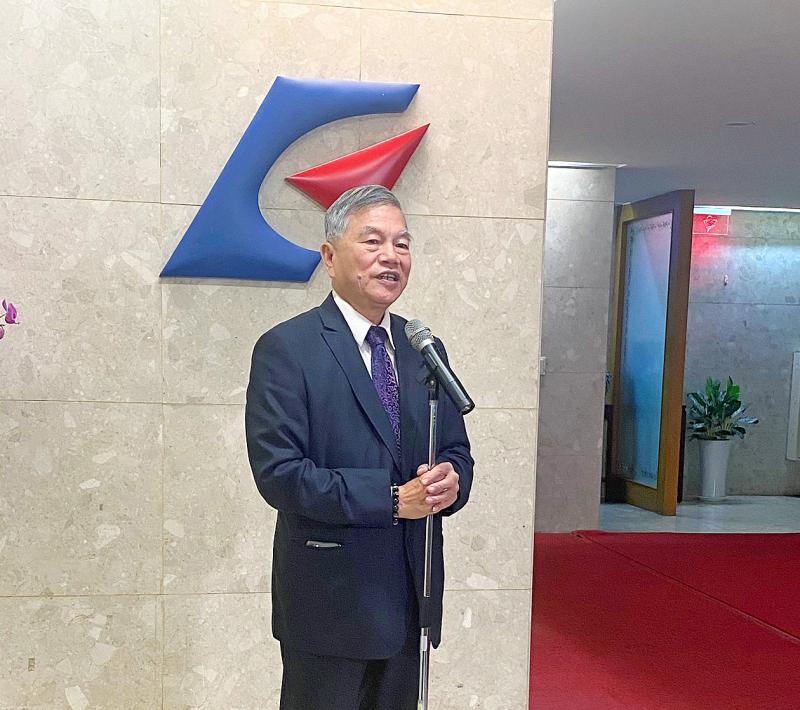The government would requisition 8 million masks daily to ensure that the nation has sufficient supplies after a ban on mask exports is lifted on Monday next week, Minister of Economic Affairs Shen Jong-chin (沈榮津) said yesterday.
“We have decided to lower the requirement from 12 million units to 8 million units per day, providing them [local mask suppliers] with 4 million more masks to sell freely according to market mechanisms,” Shen told reporters after a meeting with domestic mask manufacturers.
The figure was determined based on local market demand, Shen said, pointing to declining mask purchases as Taiwan gets its COVID-19 outbreak under control.

Photo: Huang Pei-chun, Taipei Times
However, “if the Central Epidemic Command Center’s [CECC] mask inventory falls below 100 million units, we would raise the requirement back to 12 million units [per day] for mask manufacturers,” Shen said.
The CECC’s mask inventory stands at between 200 million and 300 million units.
The mask rationing system, which limits mask purchases for each adult to nine masks every two weeks at a fixed price of NT$5 per mask, would remain in place, it said.
“This is the perfect timing ... companies can now vie for a share of overseas markets,” Shen said, adding that the Ministry of Economic Affairs would help with quality control to maintain the reputation of masks made in Taiwan.
Local firms are expected to sell and export 7 million to 8 million masks per day from next week, the ministry said.
While daily surgical mask production in Taiwan totals 20 million units, the number is expected to decline by 5 million units daily after the military withdraws its workforce from the production lines.
Since the beginning of the outbreak, the government has provided mask manufacturers with military personnel to help ramp up production to alleviate a shortage of masks in the domestic market.
Seeking to maintain the local mask supply at a healthy level, the government would continue to fix the price of essential raw materials used in their production, such as melt-blown mask filters, Shen said.
“We would help stabilize the price and ensure the quantity,” he said, adding that 8 million masks use up about 11 tonnes of melt-blown filters.
Regarding the local production of N95 respirators, Shen said the government would still requisition about 100,000 units per day from four local firms.

In Italy’s storied gold-making hubs, jewelers are reworking their designs to trim gold content as they race to blunt the effect of record prices and appeal to shoppers watching their budgets. Gold prices hit a record high on Thursday, surging near US$5,600 an ounce, more than double a year ago as geopolitical concerns and jitters over trade pushed investors toward the safe-haven asset. The rally is putting undue pressure on small artisans as they face mounting demands from customers, including international brands, to produce cheaper items, from signature pieces to wedding rings, according to interviews with four independent jewelers in Italy’s main

Japanese Prime Minister Sanae Takaichi has talked up the benefits of a weaker yen in a campaign speech, adopting a tone at odds with her finance ministry, which has refused to rule out any options to counter excessive foreign exchange volatility. Takaichi later softened her stance, saying she did not have a preference for the yen’s direction. “People say the weak yen is bad right now, but for export industries, it’s a major opportunity,” Takaichi said on Saturday at a rally for Liberal Democratic Party candidate Daishiro Yamagiwa in Kanagawa Prefecture ahead of a snap election on Sunday. “Whether it’s selling food or

CONCERNS: Tech companies investing in AI businesses that purchase their products have raised questions among investors that they are artificially propping up demand Nvidia Corp chief executive officer Jensen Huang (黃仁勳) on Saturday said that the company would be participating in OpenAI’s latest funding round, describing it as potentially “the largest investment we’ve ever made.” “We will invest a great deal of money,” Huang told reporters while visiting Taipei. “I believe in OpenAI. The work that they do is incredible. They’re one of the most consequential companies of our time.” Huang did not say exactly how much Nvidia might contribute, but described the investment as “huge.” “Let Sam announce how much he’s going to raise — it’s for him to decide,” Huang said, referring to OpenAI

The global server market is expected to grow 12.8 percent annually this year, with artificial intelligence (AI) servers projected to account for 16.5 percent, driven by continued investment in AI infrastructure by major cloud service providers (CSPs), market researcher TrendForce Corp (集邦科技) said yesterday. Global AI server shipments this year are expected to increase 28 percent year-on-year to more than 2.7 million units, driven by sustained demand from CSPs and government sovereign cloud projects, TrendForce analyst Frank Kung (龔明德) told the Taipei Times. Demand for GPU-based AI servers, including Nvidia Corp’s GB and Vera Rubin rack systems, is expected to remain high,